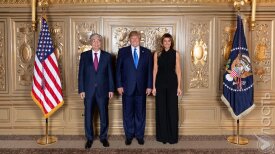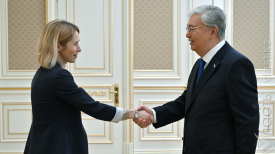Kazakhstan’s President Kassym-Jomart Tokayev traveled to Samarkand to attend the first European Union-Central Asia summit on April 4, where the sides committed to drafting a Joint Roadmap for deepening ties between the regions. António Costa, President of the European Council, and Ursula von der Leyen, European Commission President, also attended, alongside the five Central Asian presidents.
The ministry of industry said on April 2 that Tsentrgeolsemka, a private company, found a massive rare earth basin in the central Karaganda region. According to preliminary results, the deposit should hold 20 million tons of metal resources. Both the EU and the US have expressed interest towards Kazakhstan’s rare earth potential in the past.
The United States introduced fresh tariffs towards a vast number of countries on April 3, including a 27% duty on goods imported from Kazakhstan. The ministry of trade, however, reported that 92% of the supplied raw materials will fall under an exception clause introduced in the US presidential decree.
After months of domestic overproduction and constant reprimands for exceeding the OPEC+ quota, Kazakhstan’s oil exports have been curbed by the partial shutdown of the Novorossiysk marine terminal on Russia’s Black Sea coast on March 31. Two out of three docks used by the Caspian Pipeline Consortium are currently on halt. While partial, observers argued that the shutdown could be linked to the US-Russia-Kazakhstan-OPEC+ chain of spats, rather than being just a “mere coincidence.”
Kairat Maksutov, Samruk Energo’s chairman, said on April 3 that Kazakhstan will continue to invest in coal power plants as long as the country’s electricity needs are not met. Samruk Energo is part of the state-owned holding Samruk-Kazyna and will partner with Russian companies to build three new coal power stations, a trend that seems to counter the government’s claims of a significant shift towards decarbonization and green energy.
Zhanarbek Ashimzhanov and Yedil Zhanbyrshin, two MPs from the Amanat ruling party, asked for stricter monitoring of NGOs receiving foreign funding in two separate speeches in Parliament on April 2. Ashimzhanov said that some of these NGOs “promote ideas that contradict our national values.” Zhanbyrshin added that these are ““purposefully and systematically financed with millions of US dollars.” These declarations are part of a recent anti-LGBT+ push that aims to ban a number of organizations.
The Financial Monitoring Agency concluded an investigation on the Biz Birgemiz Qazaqstan charitable foundation on April 3 and sent it to court. Perizat Kairat, the former head of the foundation (from Kazakh, “We Are Together”), is accused of embezzling more than 3.5 billion tenge ($7 million) in public donations originally collected for the construction of a new rehabilitation center, for victims in Palestine, and for public works after the 2024 floods.
A Juvenile Court in the southern Kyzylorda region sentenced on April 3 nine defenders in the case of sexual slavery that had emerged in August last year. The 11 defenders in the case have now all been sentenced to four-to-eight years behind bars after being found guilty of months of abuse against a 16-year-old girl.
Saken Mamash, a former adviser to Kazakhstan’s ambassador to the United Arab Emirates, was arrested on April 4 and accused of systematic domestic violence against his wife, Karina Gosman. Last year, Gosman had denounced the beatings on social media and attached video evidence. Kazakhstan’s ministry of foreign affairs recalled the diplomat soon afterwards.
Поддержите журналистику, которой доверяют.








